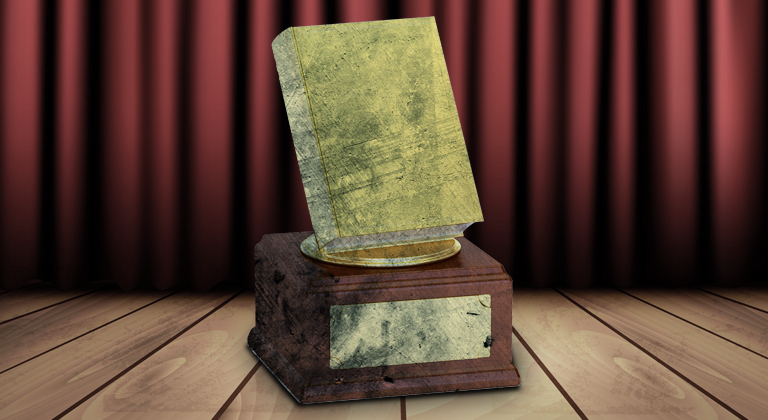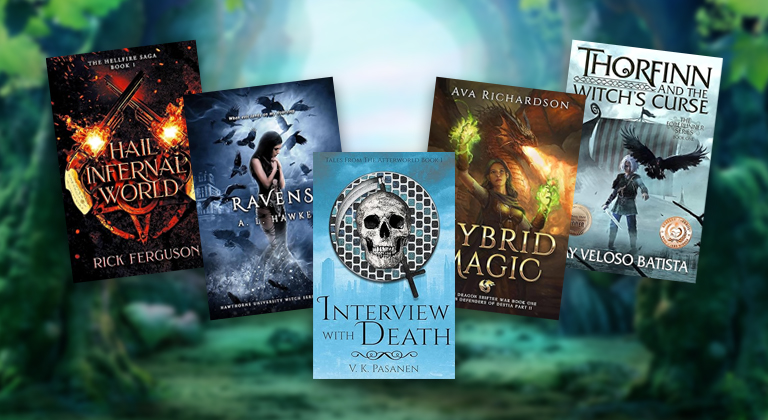Can the Hugo Awards Recover Their Credibility?
For science fiction and fantasy authors, winning a Hugo Award signifies the pinnacle of achievement in the genre, a distinction historically bestowed upon literary giants such as Isaac Asimov, Ursula K. Le Guin, and Ray Bradbury. However, recent controversies involving allegations of bias, censorship, and manipulation in the voting process have tarnished the Hugo Awards’ credibility.
Today, Ginger discusses the storied history of the Hugo Awards, tracing their evolution from their inception in 1953 through the genre’s golden ages, and confronting the present-day challenges that threaten their esteemed status. He examines the complex dynamics within the Hugo Awards and the debates these controversies have ignited among authors and fans, and considers the potential for the Hugos to reclaim their role as the definitive standard of excellence in science fiction and fantasy literature.
Author’s Note, June 2024.
Hi there! Ginger here. Back in March, I wrote an article entitled “Can the Hugo Awards Recover Their Credibility?” referencing the controversy surrounding the nominations for the 2023 Hugo Awards, which were awarded to winning writers at the 2023 Worldcon in Chengdu, China.
Months later, it was pointed out that there were some factual errors in that article, such as my claim that the 2023 Woldcon was the second to be held in Chengdu (when in fact it was the second Worldcon to be held in Asia – in 2022 the Con was held in Chicago, Illinois.) Several readers, including Hugo Award winners and nominees, and members of the Worldcon committee themselves, pointed out these errors while criticizing the article itself.
And, of course, no writer should make stupid mistakes like that when writing an article! I have no problem being held accountable for errors I’ve made. However, in re-reading the article I’d written, I realized that perhaps there was a bigger issue than just those mistakes.
I’d blithely written an article highlighting the controversies surrounding the Hugo Awards both in 2023 and in 2015 and asked the question “can the awards recover their credibility?” In doing so, I inadvertently (carelessly? cruelly? thoughtlessly?) attacked the credibility of everybody who’d ever won a Hugo Award – especially in the controversial 2023 award debacle.
It was careless, lazy, and not representative of who I try to be as a writer. I’d lost sight of who I write these articles for – writers – and tried to “report” on a news story instead. Not only did I do a bad job of that by incorporating errors, but I feel now that the tone, subject, and theme of the article were also incongruent with the sort of article I want to write.
I imagined for a second how I’d feel if I’d been recognized for a Hugo Award following a lifetime of hard work and dedication to my craft, and then had some random ginger kid with a British accent dismiss the significance of that with a wave of their hand – and in an article that contained factual errors, no less!
So, instead of just ignoring the criticism, or trying to retroactively fix the errors to pretend that they didn’t happen, I wanted to take responsibility for the tone of my article and revisit it. After all, I’ve mentioned many times how important science fiction and fantasy was to me growing up, and how influential many Hugo Award winners have been to my writing, and my enjoyment of books as a whole. The Hugo Awards deserve better, and so do the writers who took the time to read and comment on my article.
So, what are the Hugo Awards?
Before you can talk about the controversies surrounding the Hugo Awards, you have to know what they are – and I’ve always kind of described them as “the Oscars of science fiction.”
Way back in 1953, at the 11th Worldcon in Philadelphia, seven awards were given out by the organizers of the convention recognizing excellence in seven different categories of science fiction and fantasy. The original toastmaster was Isaac Asimov, no less – and the winner of the inaugural award for Best Novel was Alfred Bester, for his novel The Demolished Man – a murder mystery originally serialized in Galaxy Society Fiction.
There’d been no original plans to repeat the awards, but they were reinstated for the 1955 Worldcon in Cleveland, Ohio, and have taken place every year since. In 1961, the World Science Fiction Society (WSFS) was formed to oversee each Worldcon committee, and the rules of the award were finalized in their constitution.
Since then, the scope and scale of the Hugo Awards has done nothing but grow. Today, despite the controversies I’m about to write about, they’re pretty much universally recognized as THE global award in science fiction and fantasy writing (with the similarly famous Nebula Awards reserved for science fiction and fantasy published in the United States.)
The Los Angeles Times described the Hugo Awards as “the highest honor bestowed in science fiction and fantasy writing.” Author Jo Walton, who literally wrote the book on the history of the Hugo Awards, described them as the only science fiction award “that actually affect the sales of a book.”
So, they’re a pretty big deal – and you only need to glance at a roster of previous winners to see why that might be. Robert A. Heinlein, considered “dean of science fiction writers,” beat out Isaac Asimov to win in 1956 for Double Star, then beat Kurt Vonnegut to take the same prize in 1960 for Starship Troopers, and then won the award two more times after that!
Other winners include Philip K. Dick, Frank Herbert, Ursula K. Le Guin, Arthur C. Clarke, and Isaac Asimov himself (eventually.) That’s like a “who’s who” of the most influential science fiction and fantasy writers of the 20th century. The trend continued in the 21st century, with winners including J. K. Rowling (she who will not be named) and Neil Gaiman, and nominees including Iain M. Banks and George R. R. Martin.
The history of Hugo Award winners is like a history of the best in science fiction and fantasy writing, and that’s why being included as a winner or nominee is so important. There’s really no more significant award to win – and even to be nominated is to stand shoulder-to-shoulder with some of the greatest science fiction and fantasy writers of the last century.
And that’s the part I’d missed out in my last take on the subject. I questioned the current credibility of the Hugo Awards without even recognizing just how credible (incredibly credible, perhaps) the award had been in the past.
The Hugo Awards is IT, people – there is no higher honor in science fiction or fantasy writing. That’s why the organizers, winners, and fans of the award are so protective of it – and why the recent controversies surrounding the awards hurt them so much. To even be nominated for an award is a HUGE deal for a writer – and not something that can easily be dismissed.
It’s all very well for me to write an article questioning the credibility of the awards – but let’s face it: In doing so, I’m no different than the person sitting on the couch eating Cheetos complaining that the Academy Awards are “over” because of falling audience figures.
Ask any actor nominated for an Oscar if they feel the same way and they’d probably say “hell, no.” The Academy Awards are still as relevant as ever to actors, directors, and motion picture professionals, and writers and authors of science fiction and fantasy would no doubt say the same of the Hugo Awards (and they’d be right.)
But where did this criticism originate? Why is the “credibility” of the Hugo Awards under attack? And just what kind of controversy have they become embroiled in?
That’s a whole different story – and one that originated with a group of Internet trolls who described themselves as The Sad Puppies back in 2015.
The First Controversy
If anybody has ever tried to organize an awards ceremony, you know there are challenges. I run a very small one for fans of James Bond every year, and it’s amazing to what lengths some people will do to get themselves up on the podium – even though there’s no actual prize.
The Hugo Awards are victim to the same challenges, and in 2015 a group of disgruntled science fiction writers decided to take advantage of the inherent vulnerabilities of the voting process in order to get authors and writers they’d chosen into the nomination process. They called themselves the “sad puppies” and used voting blocs to skew the results of the voting process in favor of writers they felt weren’t “niche, academic, or overtly leftist.” The criticism was that the Hugo Awards had become an “affirmative action award” that favored minority writers
In 2016, this group tried the same tactic again – this time dominating five categories and ensuring that “their” nominees were the only ones listed. These nominees included gay erotica author Chuck Tingle for his short story Space Raptor Butt Invasion, which gives some indication of the level of maturity and sophistication with which these trolls operated.
The controversy forced WSFS to ratify a whole new set of rules to govern the nomination and voting process, but by then the damage was done. Critics of the award pointed to 2017 nominees like Stix Hiscock (for his novelette “Alien Stripper Boned from Behind by the T-Rex”) as evidence that the slate of nominees and even the winners themselves could be decided by less-than-democratic methods.
As far as I can see, the real damage this incident did was to force a question mark above the nomination of any author or book that certain groups disapproved of. George R. R. Martin, a Hugo Award nominee himself, wrote: “Call it block voting. Call it ballot stuffing. Call it gaming the system. There’s truth to all of those characterizations. You can’t call it cheating, though. It was all within the rules. But many things can be legal, and still bad … and this is one of those, from where I sit. I think the Sad Puppies have broken the Hugo awards, and I am not sure they can ever be repaired.”
The Second Controversy
However, as my twenty-year-old pick-up truck proves, something doesn’t stop just because it needs to be repaired – and following the changes to the nomination process, the Hugo Awards continued to be awarded at Worldcon in Helsinki, San Jose, Ireland, and New Zealand (albeit virtually, due to COVID 19.)
In fact, George R. R. Martin was toastmaster for the 2020 Awards – proving that even if he didn’t believe the Hugo Awards could be repaired, he still believed in them enough to participate!
But in 2023, the second big controversy hit the awards – and this time, it was surrounding influence on the nomination process alleged to come from a very different source than right-wing Internet trolls:
The Chinese government.
In 2023, Worldcon was held in Chengdu, China, for the first time (not the second time, as I’d incorrectly stated in my original article. It was, however, only the second time the 80-year-old convention had ever been held in Asia.)
Fans of the Hugo Awards raised red flags when several notable writers were mysteriously absent from the slate of award nominees – including veteran Hugo nominee Neil Gaiman, R.F. Kuang, and Xiran Jay Zhao. Each of these authors had received enough votes to be nominated for major categories. However, officials for the Chengdu Worldcon declared them “ineligible”.
Perhaps not-so-coincidentally, these authors were known for their outspoken criticism of the Chinese government, especially the government’s alleged genocide against the Uyghur people. Leaked emails later revealed that officials from Chengdu Worldcon had taken the decision to remove these authors from the nominations process in order to appease the Chinese government.
This led to another controversy – one perhaps even louder than the 2015 “sad puppies” debacle. Once again, the actions of a few people had thrown the credibility of the entire award into question – but this time, it was people from within the organization accused of wrongdoing, not external bad actors. Both the director of Worldcon Intellectual Property and the chair of the Board of Directors resigned over the controversy, and the organizers of the 2024 Worldcon vowed to ensure transparency and accountability from everybody involved in the awards moving forward.
The Aftermath
There’s no doubt that the impact of these controversies has hurt both Worldcon and the credibility of the Hugo Awards. The fact that external bad actors managed to influence the slate of nominees in 2015 and 2016 was bad enough, but it was made even worse when bad actors from within the organization also used their power and influence to exclude authors from their rightful place among the nominees in 2023.
That being said, there was an important point I’d missed out in in my original article which was perhaps even more important than the factual details I’d got wrong:
The show must go on…
…and it does.
In 2024, the 82nd Worldcon will hold the 81st Hugo Awards ceremony in Glasgow, Scotland – and a couple of years of controversy can’t possibly erase the significance of eight decades of excellence in science fiction and fantasy writing.
Nominations for Space Raptor Butt Invasion and Alien Stripper Boned from Behind by the T-Rex notwithstanding, the Hugo Awards still remains THE global award for science fiction and fantasy writing. To be nominated for an award is an incredible testament to the quality and influence of an author’s work – and to actually win one is a crowning achievement for any writer.
Perhaps Neil Gaiman was unfairly excluded from the 2023 slate of nominees. Perhaps Space Raptor Butt Invasion unfairly nudged out nominating a book that some might consider a better example of excellence in science fiction and fantasy. However, one thing remains clear: Those that won, and almost all who were nominated, deserved this honor because of their dedication to the craft of writing and their excellence in executing a story.
The credibility of the Hugo Awards might have taken a ding or two along the way, but it remains the world’s most important award in science fiction and fantasy writing; and I’m sorry if I didn’t properly acknowledge that in my original article. Every single award winner and nominee (even Chuck Tingle and Stix Hiscock) should be justifiably proud of the recognition they’ve received; and those of us who love and support the awards should view their success as nothing less than an inspiration.
2024 will be the 81st Hugo Award ceremony. I hope to witness the 100th one, and beyond.
Ginger (Roland)
THE ORIGINAL ARTICLE WITH CORRECTIONS IS BELOW:
If you’re a fan of science fiction or fantasy, you’ve undoubtedly heard of The Hugo Awards.
Presented at the World Science Fiction Convention (Worldcon) each year, the Hugos are highly regarded within the science fiction and fantasy community, and for decades have served as a benchmark of quality and innovation in a genre that often pushes the boundaries of fiction and literature.
Spanning both decades and subgenres of science fiction and fantasy, some of the most notable Hugo Award winners include Isaac Asimov for his groundbreaking Foundation series, Ursula K. Le Guin for the Earthsea cycle, Frank Herbert for the epic Dune, N.K. Jemisin for her groundbreaking Broken Earth trilogy, Neil Gaiman for his imaginative Sandman graphic novels, and Margaret Atwood for her dystopian masterpiece The Handmaid’s Tale.
However, over the course of the last few years, not all has been well at the Hugos – and a fresh scandal that broke this January is shining yet another unflattering light on an award that has already weathered accusations of rule-bending and ballot stuffing.
This leads to an inevitable and unfortunate question: Can the Hugo Awards recover their credibility?
The History of the Hugo Awards
The Hugo Awards were named after Hugo Gernsback (1884-1967) who pioneered the first science fiction magazine, Amazing Stories. Held in Philadelphia in 1953 at the 11th World Science Fiction Convention (Worldcon), the first Hugo Awards were never actually intended to be an annual event. The organizers hoped other Worldcons would follow suit, but the awards were initially just a one-off celebration.
At the ceremony, there were no official presenters; the awards were simply announced and the winners approached the stage to collect their trophies. The first Hugo trophies were rocketships made of plastic and wood, a far cry from the more elaborate statuettes awarded today.
In the years that followed, the Hugo Awards became one of the most prestigious accolades for authors of science fiction and fantasy, with many winners beginning their careers after winning one of the coveted statues.
In 1956, Robert A. Heinlein won Best Novel for Double Star and this undoubtedly helped him earn his later reputation as the “Dean of Science Fiction.” In 1965, Frank Herbert won Best Novel for Dune, the first installment in a saga that continues to be held in high regard today, and was recently re-adapted for cinema.
Other winners include the iconic Ursula K. Le Guin, George R.R. Martin, and J.K. Rowling – practically a “who’s who” of the finest fantasy and sci-fi writers of the modern age. With names like these among the winners, it’s not surprising that until recently, winners of the Hugo were considered the pinnacle writers of their genre.
Today, the Hugo Awards continue to be held annually at Worldcon, which takes place in a different city every year. In 2023, the awards were held in Chengdu, China.
However, there was controversy surrounding the official winners for the 2023 awards. This was due to concerns about potential Chinese government influence on award selection and censorship of nominated works – throwing the legitimacy of the winners into question.
That would be problematic enough if it wasn’t for the fact that the Hugos have already encountered these kind of accusations, way back in 2015, when another controversy led to questions about how legitimate the winners of the awards were.
The Sad Puppies Controversy
The cracks in the veneer of the highly-regarded Hugos appeared in 2013, in something called the Sad Puppies Controversy. This was a protest by a group of science fiction and fantasy fans and authors who felt the Hugo Awards were neglecting works by straight, white, male creators and prioritizing diversity and “political correctness” over quality.
The initial spark came in 2013 when openly conservative fantasy and science fiction author Larry Correia complained that the awards nominations for that year prioritized the books and stories of female and minority authors, who he claimed were nominated more for their political beliefs than the quality of their writing.
“The nominations are kinda controlled by certain little cliques,” he claimed in a 2015 podcast. “These little politically motivated cliques nominate all their friends and get all their people on there based on the politics of the person, not the quality of the work.”
In protest, he decoded the nominations and voting process for the awards and used a “voting bloc” of his fans to try and force the nomination of his novel Monster Hunter Legion instead.
He called this campaign “Sad Puppies” in reference to the famous SPCA ads in which singer Sarah McLachlan appeals to viewers to donate to the famous American animal shelters, with her message interspersed by images of sad and lonely dogs and cats. This is how he viewed the more diverse nominations from that year – which he dismissed as “boring message-fics” that shunned good, original writing in favor of promoting a left-wing political agenda.
His campaign continued in 2014 and 2015, along with another voting bloc campaign organized by Vox Day, which was called Rabid Puppies. Together, these campaigns were successful in stacking the 2015 Hugo Awards nominations with books that they felt better represented their vision of what good science fiction and fantasy looks like. Unfortunately, their vision did not align with many of the traditional supporters of the Hugos – many of whom complained that the existing voting system was inadequate to protect against organized voting campaigns.
Ultimately, the campaign backfired. Many voters rebelled, and in protest, a record number of categories ended with “No Award” instead of recognizing nominees being supported by the Sad Puppies or Rabid Puppies. While the Sad Puppies campaign claimed this as a victory, highlighting the supposed bias, it ultimately seriously damaged the Hugo Awards reputation.
In response, the Hugos implemented a key change to their nomination process starting in 2017 – Ranked Choice Voting. This system replaced the previous nomination system where voters could simply nominate as many works as they wanted in each category. With ranked-choice voting, voters rank their choices in order of preference. This makes it harder for a small, organized group to dominate the nominations with a single slate of works by discouraging bloc voting. However, by then, the damage had already been done.
The Chinese Voting Scandal
In the years that have passed since, the organizers have worked hard to rebuild the reputation of the Hugo Awards as the world’s premiere accolade for science fiction and fantasy writing, and haven’t been entirely unsuccessful.
However, all that hard work got thrown into question during the most recent awards.
The controversy arose this January, after the awards ceremony, when the final voting data for the 2023 Hugos was released. It revealed that several works, including R.F. Kuang’s critically acclaimed novel Babel and Xiran Jay Zhao’s Iron Widow had received enough votes to be nominated for major categories.
However, officials at the Chengdu Worldcon, who were responsible for administering the Hugo Awards that year, declared these works “ineligible”. No explanation was provided for the disqualification, raising concerns about transparency and potential censorship. The only statement made was a since-deleted Facebook post by Director of the World Science Fiction Society, Dave McCarty, who simply wrote:
“After reviewing the Constitution and the rules we must follow, the administration team determined those works/persons were not eligible.”
This is noteworthy because both Kuang and Zhao were both born in China, and have spoken openly in opposition to the Chinese government, especially regarding the issue of the Chinese genocide against the Uyghur people. It led many people to consider whether their exclusion from the awards was a result of political pressure from China.
The revelation sparked immediate outrage within the science fiction and fantasy community, with fans and authors questioning the legitimacy of the awards and accusing Worldcon of censorship. On January 30, Worldcon Intellectual Property, the nonprofit which organizes the Hugo Awards, announced the resignation of Dave McCarty and World Science Fiction Society board chair Kevin Standlee – but other than that, has made few official statements regarding the controversy. This has failed to appease concerned fans, and has once again thrown the legitimacy of the Hugos into question.
What is the future of the Hugo Awards?
Although mired in controversy, the Hugos cling to the motto of “the show must go on” and plans for the 2024 ceremony are already well under way. Nominations for the 2024 awards closed in January, and the nominated works will be revealed in the spring.
Worldcon itself is going to be held in Glasgow, in the United Kingdom, in August of this year – and some significant changes have been announced to reassure fans and authors that the process will be transparent and legitimate. Firstly, Glasgow Worldcon has committed to publishing the reasons for any books or stories being disqualified by April 2024 – giving plenty of time for fans and authors to react if they feel the disqualifications are unfair.
Likewise, full voting results and explanations for any administrative decisions will be made public directly after the ceremony, hopefully preventing controversy erupting months after the awards themselves, as occurred in 2023.
But it’s going to take people a long time to forget the results of the 2023 Hugo Awards and that means the similar controversy of the Sad Puppies campaign suddenly doesn’t seem to have taken place quite so long ago. The legitimacy of the Hugos has definitely taken a big hit, and it’s uncertain whether the awards will ever again be considered the pinnacle of science fiction and fantasy writing.
But only time will tell – and as a passionate fan of science fiction, I’ll be taking a special interest in seeing how the awards play out in the future. I want the Hugo Awards to recover from these controversies – the question is whether they can in an era that seems to make censorship and voter manipulation so easy and effective.
What are your thoughts about the Hugo Awards controversies? Do you think the awards can recover their reputation? I’d love to read your thoughts in the comment section below.












Its still wrong to conflate Chuck Tingle and that other pseudonym: Chuck is a much beloved member of the fan community, especially for his activism. Nominating Space Raptor was a deliberate ploy by the “puppies” to force voters to either endorse one of their nominations OR No Award the category and deny Chuck a possible win.
The pseudonym’s garbage was meant as another “poke in the eye”.
There’s no comparison to be had between an effective activist and an a-hole.
How does a writer not make corrections in an article? News does it, magazines do it. Are you better than the “pros” or are you saying your work isn’t worth reading so why make corrections? Bad blogging. Everything we post on the internet lives a very long life (see the “Way Back Machine”). Talk about a shining example of infamous.
Where on earth did you get the idea that WorldCon (or “WonderCon” if you prefer) was held in Chengdu twice? Or that the 2023 Hugos have “no official winners”? Check your facts.
The number of factual errors in this article certainly make he analysis and conclusions suspect.
Here’s a BIGGER question; will Roland Hulme’s reputation as a ‘journalist’ ever recover from such a badly written, error ridden, ill conceived and badly executed piece of drivel ever to grace the internet.
My Fanduel app says, DEFINITELY NOT! Thanks For Playing, Mr. Hulme…
Chris M. Barkley
Winner of the 2023 Hugo Award for Best Fan Writer
Hi, Chris. Thank you for your comment. I made a couple of obvious mistakes in this article (like saying WorldCon had been held in Chengdu twice, when in fact it was merely the second time it had been held in Asia) and honestly, that’s an indictment of me trying to hastily cover what is actually a very complex and evolving issue.
In fact, I found your own report about it (which you wrote with Jason Sanford) a really phenomenal insight into the situation. I won’t correct mistakes after the fact because that’s like pretending they didn’t happen (and if you stick your name on something on the Internet, it deserves to remain there) so I’m sure other people will see my mistake, but hopefully comments like this provide context and accountability regarding it.
More so than that, however, I think the way I’d covered this topic was totally tone deaf to the wonderful authors who had legitimately won a Hugo award in 2023 – as if “it didn’t count.” The fact is, regardless of whether or not some authors were unfairly ineligible in 2023, or whether the voting for them had been nudged or influenced by voting blocks (like Chuck Tingle being a finalist in 2016 for “Space Raptor Butt Invasion”) they still write wonderful things that are worthy of recognition and respect.
The Hugo Awards are still the gold standard for writing science fiction and fantasy and what I wrote unfairly and callously detracted from that. It also makes me hypocritical. The other day, somebody was criticizing the fact that my 12-year-old took pride in reading a 6-book series of books about Boba Fett by saying “they’re only Star Wars books, they’re not REAL books” and I pointed out that the author, Terry Bisson, had won both a Hugo Award and a Nebula Award (the Star Wars franchise doesn’t screw around when they ask authors to write for them.) If the awards have “lost their credibility” why am I still using them as an example of the best in science fiction writing.
I don’t normally write “news” articles, since my wheelhouse is more about advertising and marketing, and in future if I do, I’ll be more diligent about what I commit to the page. I thank you and respect you for your criticism and will do better in the future.
It’s a mistake not to include corrections in your original piece.
You use things like footnotes, parenthesis and brackets. Add a date. Stick a note at the beginning of the article stating that there were numerous FACTUAL ERRORS in the original article that have now been corrected (either inline or in footnotes).
Not noting these facts up front only helps to perpetuate the errors.
Ginger:
I replied in such a disrespectful manner because I have been a member of the sf fandom community for 49 years and reading your article, which pepetuates myths, has falsehoods concerning the Hugo Awards and was just too painful to read or ignore.
Having and expressing an opinion is fine but you set yourself for failure when you display a shocking lack of knowledge about the subject you choose to write about.
And what’s most disturbing is your statement that, “I won’t correct mistakes after the fact because that’s like pretending they didn’t happen (and if you stick your name on something on the Internet, it deserves to remain there) so I’m sure other people will see my mistake, but hopefully comments like this provide context and accountability regarding it.”
Uh, no, I cannot agree with that assessment. Chengdu DID NOT hold two consecutive World Science Fiction Conventions in 2022-2023, Chicago was the site in 2022. Ray Bradbury DID NOT win the first Hugo Award for Best Novel in 1953, the late Alfred Bester did for the Demolished Man. Leaving “facts” like that hanging online make you look uninformed, silly and not very serious about your subject.
Not citing sources to bolster your opinion, such as the report I wrote with Jason Sanford, just makes matters worse.
Correcting your mistakes and owning up to them shows that you can take responsibility for them and shows that you, and those reading it can learn as well.
If you are unwilling to follow these few basis tenets of journalism or essay writing, I will kindly suggest you stick to writing romance novels…
This wasn’t an article; it was propaganda. Before writing this sycophantic nonsense, did you spend any time doing actual research into the people involved in the Sad Puppies campaigns? No, don’t bother to respond. It’s quite obvious you didn’t. Otherwise, you would’ve written a very different article that would in no way flatter anyone involved with the Hugos since then.
To use a sporting analogy, the Hugo controversies are a classic case of playing the man and not the ball.
The obvious solution is for publishers to submit the works ‘blind’ i.e., the author is unknown, but as that’s unlikely to guarantee the required ‘balance’ of winners, I can’t see the organisers adopting it.
Nick caused electrons to glow:
“The obvious solution is for publishers to submit the works ‘blind’”
Submit the works to who?
I suspect Nick is unaware that nominations for Hugos are drawn from the community – anyone who has a membership to the year’s WorldCon is eligible to submit nominations. Blind nominations are impossible given the mechanic of the awards.